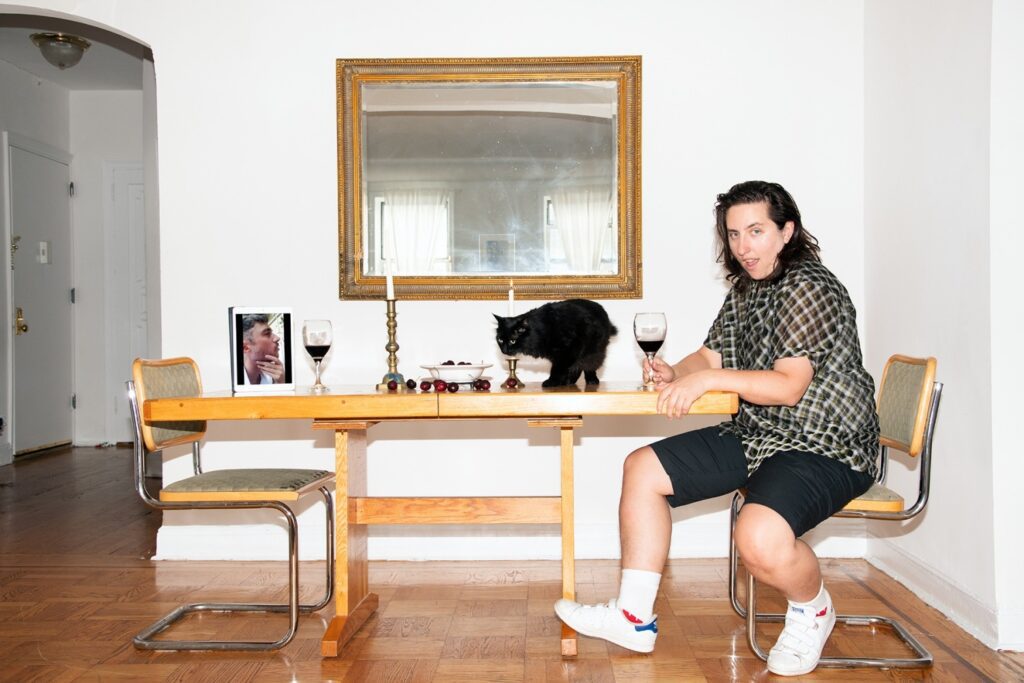On a warm June evening, Lily Marotta and Steven Phillips-Horst, comedian hosts of the podcast Celebrity Book Club with Steven and Lily, are talking over each other at Cafe Mogador in Manhattan. “That’s why we love the East Village, because we feel like — ” Marotta says. “We’re total Patti Smith-ers,” Phillips-Horst cuts in. “Yeah and like, love how so many memoirs are always about just doing heroin on Avenue C,” Marotta says.
To borrow the syntax of CBC, they are very Bushwick roof party right now. Phillips-Horst has a scruffy beard, a sly grin, and short, fluffy hair. He arrives at the restaurant with two small hoop earrings in his left ear, wearing yellow Prada sunglasses, and a baseball cap cocked back on his head. Marotta — with doleful blue eyes and a shy, mischievous smile — has her shoulder-length brown hair brushed back and pushed behind her ears in a style she describes as “Travis, the skater from Clueless, meets superstitious MLB player.” They’re very downtown alt-comic, very Brooklyn brunch crew. They each order a mezcal cocktail called the Controversy.
Best friends and celebrity-obsessives since middle school in Cambridge, Massachusetts, Marotta and Phillips-Horst have pored over gossip magazines together, cut class to meet their idols, shared a New York apartment, and appeared on each other’s web series. Since 2015, when they both read Leah Remini’s book, Troublemaker, about escaping Scientology, they’ve wanted to talk about celebrity-authored books together on a podcast. In January, they went for it.
CBC episodes run about an hour, going into detail on a single celeb bio, from Andre Agassi to Steve Aoki to even WWE superstars the Bella Twins. As Marotta and Phillips-Horst gossip about the foibles of the delusionally wealthy with savage glee, they welcome listeners into their inside jokes and anecdotes. “We’re trying to make [listeners] feel included in our friendship, like you’re part of the squad,” Marotta says. “I want people to be getting martinis, being like, ‘we’re being so CBC right now.’”
The podcast isn’t a book recap, per se. The hosts act primarily as cultural critics, dissecting (and often roasting) the personalities and pathologies of their subjects and the zeitgeists in which they thrived. Tangential and oftentimes surreal, their meditations spin out from a nugget of an observation to elaborate, imagined conclusions about people’s lives. Any famous person with enough ego to write a book about themselves is fair game. CBC has covered restaurateurs (David Chang, Danny Meyer), comedians (Aziz Ansari), real estate moguls (Barbara Corcoran), attorneys (Johnnie Cochran), and political spouses (Chasten Buttigieg). But their comfort zone is women who peaked in the Nineties and early Aughts: Sharon Stone, Demi Moore, Jessica Simpson, Shania Twain. “If we didn’t really think about who we’re picking, we would always just do Nineties actresses,” Phillips-Horst says.

Steven Phillips-Horst, Orzo the cat, and Lily Marotta (from left).
Macey J. Foronda for Rolling Stone
Growing up near Boston, Marotta and Phillips-Horst devoured Us Weekly and the National Enquirer, Marotta papering her walls with magazine cutouts of fashion models, athletes, and rappers, while Phillips-Horst plastered his in images of Mary-Kate Olsen — and only Mary-Kate Olsen. “She was the badass one,” he says. “I would rip Ashley out of the photos if there was two of them.”
Their senior year of high school, they cut class to meet Heidi Klum when she was taking photos with fans and signing autographs at a nearby mall. “We blurt out, ‘We skipped school to meet you,’ thinking she would love our devotion to her,” Marotta says. “In reality she is a strict German mother. Her smile fell and she said very sternly, ‘That is very bad, you should never skip school.’ I think we got very awkward and said sorry, and still got our photo with her.”
Sipping their Controversies, Marotta and Phillips-Horst theorize about the allure of celebrity. “It’s a fun escape,” says Marotta. “We don’t have a royal family. You need someone to idolize who is outside of your life and who is more fabulous than you.”
“And, you know, the function of the royal family throughout history was to give the peasants something to look at,” says Phillips-Horst. “It’s ‘bread and circuses’: give them food and entertainment, and they will not care about their oppression. They will be docile. And so the carnival of celebrity keeps the masses down. And here we are here, indulging in it.”
Once they were both in New York post-college, Marotta and Phillips-Horst embedded in the local comedy scene — Phillips-Horst hosted a monthly underground comedy night in a Chinatown restaurant and Marotta hosted a queer speed-dating series — while working jobs outside of performing. Marotta still earns money as a maid and freelance casting producer, while Phillips-Horst has been a staffer on several political campaigns and works as a copywriter, among other gigs.
In 2019, they began recording their first episodes from Phillips-Horst’s Brooklyn apartment. Then, podcast impresario and former host of the renowned podcast Slow Burn, Leon Neyfakh, picked them up to be produced by his Prologue Projects.
Their irreverent and dishy comedy is a departure from the company’s roster of political and civic content, but Neyfakh, who initially connected with Marotta to have her on an episode of Slow Burn after he saw her play Monica Lewinsky in a web series, couldn’t resist. “I just thought they were so funny,” Neyfakh says. “They have this completely foreign energy — more accurately, two energies that I had never heard in combination with each other.”
With Prologue Projects onboard, they moved briefly into a real studio, but right back to Phillips-Horst’s apartment when Covid hit, before they’d found a distributor. “We were being pitched during a fucking pandemic, and Spotify passed — good riddance,” Phillips-Horst says. Marotta jumps in: “And yes, I am a monthly subscriber to the Spotify network, but that’s just because they put me in that place.” Because of Covid, the podcast didn’t reach listeners until January 2021, more than a year after the first recordings, with Headgum handling distribution.
The 15 episodes they’d banked before the release helped the series emerge seemingly fully formed, as though listeners were tuning into a program that was already mid-stride. In more recent episodes, they’ve occasionally invited guests: friends from the comedy, media or podcasting worlds.
They roast celebrities, themselves, and each other in almost equal measure, specializing in extrapolating upon the imagined details of their subjects’ private lives. Sometimes it’s sex, but more often, interior design. Episodes culminate in “Segments,” where the hosts define “What does she wear? What does she eat? How does she live?” loosely based on what they gleaned from the book. (As Phillips-Horst explained to comedian guest Jacqueline Novak on one episode, the celebrity gets “the royal she” pronoun, regardless of gender identity.)
Inside their imagined world of other people’s lives, Marotta and Phillips-Horst’s back-and-forth thrives, with each egging the other on. They’ve been practicing for years, speculating to one another about, for example, the implications of a shopper’s metal Chase Sapphire credit card in a clothing store. “They’d be paying and we’re sitting there like, church giggles, like can’t even contain ourselves because we can’t wait till we get outside and be like, ‘Oh my God. Did you see?’” Phillips-Horst says. “I’ll be like she is so divorced [working in] advertising.” Adds Marotta, “And I’m like, please, she’s second marriage Park Slope.”

Lily Marotta in her Brooklyn apartment and Steven Phillips-Horst on an iPad from France.
Macey J. Foronda for Rolling Stone
“It always amazes me how many different anecdotes they can pull out of their sleeve,” Neyfakh says. “They have these encyclopedic memories of tabloids they read in high school. A lot of people, when they talk extemporaneously, can’t reach for specifics so easily. That ability is what makes it virtuosic.”
A subject’s aesthetic, even imaginary, can tell you a lot about them. Sunken living rooms — channeling, specifically, the Frasier set — are very good vibes. A white woman with Buddha statues means trouble (and a troubled white woman probably has a Buddha). “There is this really intense need for celebrities to just be like, ‘A Buddha is peace and if I have the Buddha then I am at peace and I sleep well at night,’” Phillips-Horst says. “So clearly you’re actually the tensest if you have a Buddha in your home,” says Marotta.
The podcast is slow to rise on the Apple charts but has gathered a devoted word-of-mouth following. Neyfakh says he’s never worked on a podcast that his friends text him about every week. “I have to silence my phone on Wednesday mornings because I have a couple friends who just live-text [the episode] to me with exclamation points and emojis,” he says. The podcast was officially renewed in June for a second season. Marotta and Phillips-Horst are planning to start selling merchandise and have recently invited fans, who they’ve dubbed “club kids,” to leave voicemails that they responded to on their first call-in episode earlier this month. As pandemic lockdown measures lift, they’re also eager to record some shows live in front of audiences.
Yet if things had gone differently during Covid, there might not even have been a CBC.
“I told Lily all the time, ‘Don’t get your hopes up. This isn’t happening. We’re not getting distribution,’” Phillips-Horst says.
“You were just being so, ‘Honey, I’ve been in this town.’ And I was like, ‘Same?’ I also have been in this town?” Marotta says. “I would say I was more, girl outside of Port Authority with her suitcases. I was definitely telling Steven it was going to happen.”

